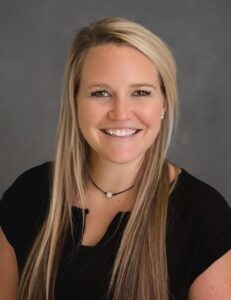Kids diagnosed with a chronic disease are often told to look for role models thriving with the same health condition. Luckily, the young patients of Brooke Foth, RDN, CDCES, do not have to look far. As a diabetes care and education specialist living with Type 1 diabetes, Brooke knows all too well the challenges her patients face and is able to counsel them with both expert knowledge and insider experience at Logan Health Specialty Care in Missoula. She shares her story below to spread awareness during Diabetes Month and to encourage anyone in the diabetes community.
 When and how did you find out that you had Type 1 diabetes (T1D)?
When and how did you find out that you had Type 1 diabetes (T1D)?
I was 17 years old when diagnosed with T1D. I had the typical symptoms: weight loss, excessive thirst and hunger.
How did you feel upon receiving your diagnosis?
I was shocked. Diabetes does not run in my family, and I only knew one other person with T1D. I immediately started reading and researching ways to best manage my diabetes. I kept close blood glucose logs for the first year or so and wanted to find out how to best manage my diabetes.
Has that feeling changed throughout the years?
Yes, I now have accepted diabetes into my daily life and have learned from the ups and downs. Diabetes is always changing, and we go through different phases when we may need more or less insulin. I have learned to adapt and look for patterns to do the best I can.
Did your personal diagnosis inspire your profession?
Yes! After discovering the role of a diabetes educator, I decided to pursue a career as a dietitian with plans to help others with T1D. Living with T1D myself I want to provide a personal touch to all patients and families.
What was most helpful to you as you learned to navigate life with Type 1 diabetes?
Learning and accepting that no day with diabetes is ever the same. You can do everything you are supposed to: take your insulin, count your carbs, exercise, and there will always be variability in the results. I had to learn to accept this and deal with the ups and downs. Reviewing patterns and learning how your body responds to your routine is key to thriving with diabetes.
In what ways have your personal experiences aided you in helping pediatric patients?
I love sharing nutrition and education tips that have worked with my own diabetes. For example, having a high protein breakfast, favorite low carb snacks to have on hand, and different ways to wear my insulin pump!
Do you have any advice for kids who are managing diabetes?
You can do ANYTHING with diabetes. Do not let diabetes stop you from chasing your dreams. There are individuals thriving with type 1 diabetes in the Olympics, NFL, even hiking Mount Everest!
Do you have any advice for parents who are helping their children manage diabetes?
Diabetes is a lot of work and diabetes burnout is very real. I always encourage parents to ask their child, teenager, or even young adult what they can help them with. The person with diabetes is thinking about diabetes all day long. If someone can take part of the burden off by helping change a pump site, counting carbs, or reminding them to bolus, it makes a big difference and, in the end, will help them thrive with their diabetes.
In the photo below, I am hiking in Glacier National Park, my favorite place! I had just gotten my Tandem Mobi insulin pump and was excited to show it off!
To learn more about Logan Health’s Pediatric Endocrinology and Diabetes team, go to logan.org/childrens.

